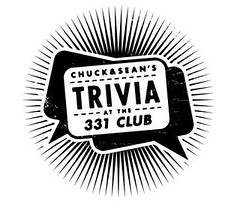
MINNEAPOLIS' OWN ROBERT Skoro has been making music for an awfully long time for someone who's just 25. He got his start playing bass with Mason Jennings back in the late '90s, but since leaving Jennings' band, he's carved out his own niche with his independently-released debut, Proof, and his sophmore follow-up on Yep Roc Records, That These Things Could Be Ours. After a stint in Philadelphia, he returned to the Twin Cities and has been playing around town again and working at the 331 Club in Northeast. Since starting there, he's helped put together Sean and Chuck's Trivia, which happens every Sunday night there. He's got perfect pitch and writes compelling and thoughtful songs about everything from love to politics to loss, so naturally, the best place to start would be to ask him about music.
Bottle Gang: I'm going to ask you about bartending.
Robert Skoro: Oh my god.
BG: When did you start bartending?
RS: A little less than a year ago.
BG: And at the 331?
RS: Pure nepotism. That's like the story of me and this city, is just pure nepotism. I had enough experience running Caffetto to be comfortable working by myself. I move really fast and you need to if you're going to work in the food service industry if you're going to work in any sort of branch. So I think Jarret's words himself were, "Dude, a monkey could bartend." Make the drinks, take their money, give them the change. It was just a matter of—Jarret and I had never met, but I knew a couple other people who worked there already, and I knew Jarret's dad. It's a real small, tight-knit kind of staff. Everybody is related. There's two people who work there who aren't related who are childhood friends of the family, and I'm one of them. Nepotism. We haven't hired anyone since.
BG: But you haven't just been a monkey. I know you like making drinks.
RS: It's been really fun to take on that part of it. I'm kind of a foodie to begin with, but I was never the kind of person to keep a bar at home and make stuff at home. If you play music, you're in bars enough where you're just drinking brews most of the time. It's fun to get to study that stuff. The 331 was really great because they have such a vast selection ofliqueurs, so you can get really creative with the stuff. It's not just always some kind of liquor and a gun.
BG: Do you feel like you're getting a clientele, if I can use that word, that orders that kind of stuff? Has that been the vibe? Because I know I go there and look at the back wall and go, "Hey, you have that and you have that and you have that."
RS: Well, it's still a neighborhood bar. But a good thing to keep in mind about what we're doing there on Sundays, it's a scene that I basically told Jarret, this is what I want to try and do. I have enough people who are running some kind of hustle that could help bring people in here and create an atmosphere that's not just random people ordering Long Islands all night. It's people that I engage with in conversation with both in and outside of the bar so you can create this kind of environment where you can just suggest something to someone, and they'll gladly try it out.
BG: So what's your current favorite drink?
RS: Well, that's kind of a tough one. I've gotten really into this liqueur called Gammel Dansk, which is a kind of sweeter, less pungent liqueur like Fernet Branca or Pernod. I'm a pretty bare bones kind of guy. Usually a really nice rum or gin and a little bit of citrus and maybe a splash of something. Nothing all that fancy. I've sort of been making these modified versions of what you'd call a Dark and Stormy, which is rum and tonic and cola and citrus. We've got that ginger wine at the bar—that's really fun to use. You can use it in place of ginger ale for a lot of things. It's a great little secondary kind ofliqueur.
I guess mostly there aren't really drinks that I get into so much as there are kinds of alcohol I like to toy around with. For a while, it's been the Pirate Rum, which is just delicious. I think of rum and I think of getting really, really sick when I was 14.
BG: I think that's a problem that a lot of people have with certain alcohols—tequila gets a bad rap for that, gin also gets a bad rap for that—because bad gin and bad tequila are horrible. But good stuff is good. Good gin, good tequila—you can sip good tequila like you would sip whiskey.
RS: It's amazing how much, especially brown liquors—well, any liquor: I take that back—it's kind of amazing how much a really great product can transcend the status quo for what people think. I remember the first time I had Hendrick's or a nice yellow Patron. It's almost like a different liquor from something bar pour or Cuervo, even.
BG: I've always felt that really good gin has more in common with really good whiskey than it has with bad gin, in the sense of an experience, because it becomes complex. You get a lot out of it. When you drink Hendrick's, there are a lot of different notes and flavors going on. It's a totally different experience.
RS: That tends to be the trend with any top shelf liquors—the recipe is dialed in and you're wasting your money if you're going to start doing things that are going to challenge the pre-existing properties of the alcohol. Just getting into a nice brand of alcohol and doing little subtle modifications to it, but never going too out of control.
I had some of that potato vodka—the Chopin—I had never tried that and I don't really like vodka all that much, but the Chopin was really nice. Vodka's supposed to be colorless, tasteless, odorless legally, but somehow they always end up having these distinctive characteristics, even if they are filtered. The Chopin just had a fundamentally different quality to it. I really liked it. I think people drink vodka because they associate it with being a refreshing beverage, and the Chopin is by far the most transparent.
BG: I've been really into this Bison Grass Vodka which is really delicious. It has a spear of grass in the bottle, and it's slightly green. It's got a kind of slippery quality to it, almost a sake kind of thing. But it's really good. I can sip a shot of that, but generally—that's the weird thing about vodka: it's essentially a dilutant to whatever you're going to drink because it's supposed to be like water, but alcoholic. So it's weird because we got a sample of Reyka and it's almost completely tasteless, odorless, whatever, but for that reason it's great to combine with other things. The thing about that high-end vodka is that you can use other stuff and have a good drink because it lets that other stuff work together without getting messed up by some funky flavor you don't want in there.
RS: You know, one drink that I'm really into right now is a Bloody Mary made with Citron, Peppar and about two fingers of Guinness in it. It's really something else.
BG: That sounds good. I've been a little interested in Bloody Marys since I went to Topolobampo in Chicago. They only have tequila drinks and they had a drink called a Vampiro, which is a crazy Mexican Bloody Mary. (McPHERSON)
To continue reading about Skoro's musical endeavors, head to the jump over at Signal Eats Noise.

 2 oz. whiskey
2 oz. whiskey


No comments:
Post a Comment